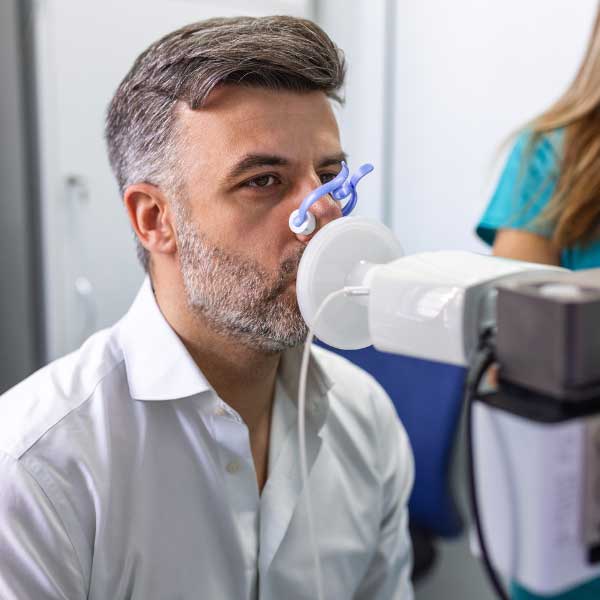
The cardiopulmonary exercise test is a stress test that measures how your heart and lungs work together and respond to different levels of exercise. If you find yourself abnormally short of breath during exertion, or if you have heart or lung disease, your doctor may order this test for you.
How Does the Cardiopulmonary Exercise Test Work?
Monitors will be placed on your forehead, chest and arm to measure your pulse, oxygen levels, heart rhythm and blood pressure. You’ll also be asked to breathe into a mouthpiece attached to a machine that will measure the volume of, and analyze, the gases in your exhaled breath.
You’ll be asked to perform gradually increasing levels of exercise on either a treadmill or stationary bike. A technologist, along with a doctor or nurse, will monitor you closely and the results will be recorded.
How to Prepare for Your Test
On the day of your test, be sure to:
Wear loose clothing and comfortable shoes appropriate for exercise
Shave off any chest hair before your appointment
Continue to take any prescribed medications unless you are told not to by your physician
Avoid smoking or exposure to carbon monoxide (a colorless, odorless gas produced by burning gas, wood, charcoal, propane or other fuel)
Don’t eat a large meal at least three hours before the test
Don’t drink alcohol for at least four hours prior to the test
Your appointment may be rescheduled if you haven’t prepared according to these criteria.
Call us ahead of time if you:
Have an inability to follow instructions*
Have had a heart attack (myocardial infarction) in the last two days
Have uncontrolled chest pain (angina)
Have other known acute or chronic heart conditions, such as severe aortic stenosis aneurysm
Have uncontrolled hypertension (greater than 200 mm Hg/110 mm Hg at rest)
Have had a recent stroke or transient ischemic attack
Have had acute pulmonary embolism or deep vein thrombosis
Have a physical disability that prevents safe and acceptable testing
Have an uncorrected medical condition, such as significant anemia, important electrolyte imbalance and hyperthyroidism
*If a patient is unable to follow instructions due to a confused state, young age or dementia, then a parent, caregiver or guardian may call on their behalf.
Medications to Pause Before Your Appointment
You can view medications to pause before your test:
Need More Information?

The American Thoracic Society provides more information on CPET.
If you have any questions about your test, please call us:
Adult Testing
Pediatric Testing
For your health information, including access to medical records, lab results and bill pay, download our MyHealthMate app today.
We use cookies and other tools to optimize and enhance your experience on our website. View our Privacy Policy.

